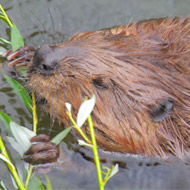Beavers released into the Forest of Dean

Plans to reintroduce the beavers to the Forest of Dean were announced by The Forestry Commission in March 2017.
Defra has confirmed the release of two Eurasian beavers in the Forest of Dean, 400 years after the species was driven to extinction.
The move is expected to improve biodiversity and reduce the risk of flooding in the village of Lydbrook.
Beavers have a key role in the creation of habitats of other plant, insect and mammals species. By creating dams and by felling trees, it is hoped the beavers will stem the flow of water in the Greathough Brook and reduce the risk of flash flooding.
Environment secretary Michael Gove who attended the release said: “The beaver has a special place in English heritage and the Forest of Dean. This release is a fantastic opportunity to develop our understanding of the potential impacts of reintroductions and help this iconic species, 400 years after it was driven to extinction.
“The community of Lydbrook has shown tremendous support for this scheme and the beavers will be a welcome addition to local wildlife.”
Plans to reintroduce the beavers to the Forest of Dean were announced by The Forestry Commission in March 2017. Natural England then granted the Forestry Commission a license to release beavers into a carefully chosen and secure site.
“Beavers are natural habitat engineers, restoring complex wetland habitats and providing habitat for declining species whilst slowing the flow of water downstream,” said Rebecca Wilson head of planning at the Forestry Commission.
“We are delighted to welcome beavers to the Forest of Dean and are keen to observe the many benefits they will bring to both local communities and the wider Forest of Dean environment.”



 The Veterinary Medicines Directorate (VMD) is inviting applications from veterinary students to attend a one-week extramural studies (EMS) placement in July 2026.
The Veterinary Medicines Directorate (VMD) is inviting applications from veterinary students to attend a one-week extramural studies (EMS) placement in July 2026.